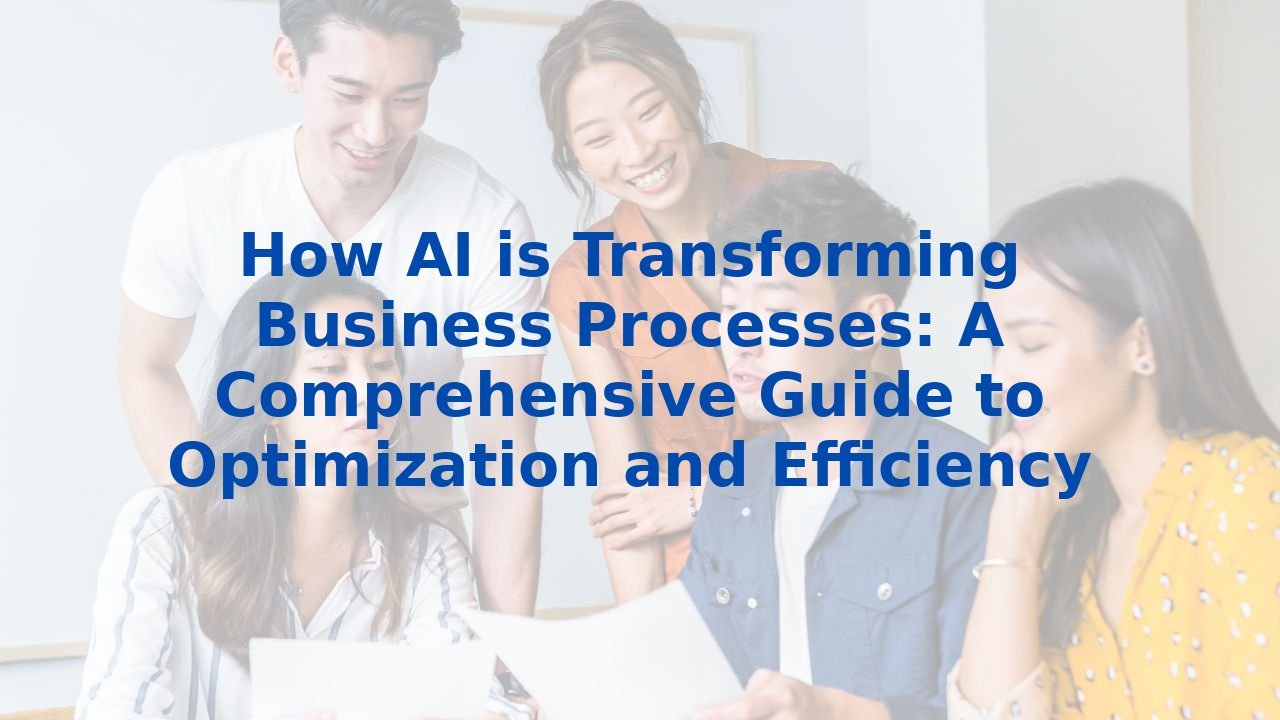How AI is Transforming Business Processes: A Comprehensive Guide to Optimization and Efficiency
How AI is Transforming Business Processes: A Comprehensive Guide to Optimization and Efficiency
In the ever-evolving landscape of business, one constant remains: the necessity for organizations to operate efficiently amidst increasing competition and demands. Enter Artificial Intelligence (AI)—a game-changer that is revolutionizing how businesses streamline processes, improve customer interactions, and innovate at every turn. This guide uncovers how AI enhances essential business processes, highlighting tangible benefits that organizations can harness for increased efficiency.
1. Improving Front-Office Processes
The front office is often the lifeblood of any organization, where sales and customer engagement happen. AI steps in here by driving sales strategies, enhancing customer satisfaction, and boosting employee engagement. With the power of predictive analytics, AI tools can automatically sift through data to identify high-value customers and potential churn risks. This capability allows teams to tailor their approaches, personalizing interactions for maximum impact.
Moreover, AI-powered chatbots and virtual assistants are becoming ubiquitous, handling inquiries with remarkable efficiency. Utilizing natural language processing (NLP), these tools guide employees through processes and elevate the overall customer experience. The result? A more agile front-office that adapts to real-time business dynamics.
2. Enhancing Business Process Mapping
Traditionally, mapping out business processes has required manual input, dragging down potential efficiency. Thankfully, AI is transforming this landscape. Machine learning models can now perform automatic mappings of processes, pinpointing areas ripe for improvement and automation.
For instance, consider an AI system monitoring a production line. It can identify bottlenecks in real time, offering corrective actions to operators, ultimately driving productivity. This intelligent mapping not only streamlines operations but also ensures continuous improvement in business workflows.
3. Automating Repetitive Tasks
One of AI's most significant advantages lies in its ability to take over mundane tasks that are repetitive and time-consuming. From data entry and invoicing to accounting, AI frees up precious human resources for strategic endeavors and creative thinking. This shift leads to a paradigm where employees can focus more on innovation rather than being bogged down by routine activities.
Furthermore, AI’s capability to rapidly analyze large datasets uncovers vital insights, empowering organizations to make data-driven decisions that enhance their operations. This refinement of processes paves the way for increased productivity and organizational growth.
4. Enhancing Customer Service
Customer service is the face of your business, and AI is enhancing this aspect like never before. AI tools provide real-time assistance to customer support agents, enabling them to deliver prompt and accurate responses to customer queries.
For instance, AI can evaluate customer feedback and sentiment, delivering insights that help in improving service quality. By analyzing interactions, AI identifies areas where service may fall short, enabling organizations to continually refine their approach and keep customers satisfied.
5. Optimizing Product Development Processes
Innovation is the heartbeat of sustainable growth, and AI is a powerful ally in this arena. By employing generative design technologies, businesses can input their project requirements and let AI explore endless possibilities for achieving those goals. This method drastically reduces the time and resources spent on physical prototypes, expediting the development process while ushering in a wave of creativity.
6. Benefits of Training Employees for AI
While AI undoubtedly enhances operational processes, its full potential can only be unlocked when employees are adequately equipped and trained to utilize these technologies. Investing in AI training empowers your workforce to understand and interpret the insights generated by AI systems efficiently.
Comprehensive training provides employees with the skills to leverage AI tools, comprehend their limitations, and integrate them seamlessly into existing workflows. This skill development fosters a culture of innovation within organizations as employees become adept at maximizing the potential of AI technologies.
7. The Future of Business Process Management with AI
Looking ahead, the integration of AI into business process management is set to transform how organizations operate fundamentally. By revealing trends, predicting outcomes, and automating manual tasks, AI provides a clearer understanding of operational performance, enabling better decision-making.
As organizations embrace the evolution brought about by AI, they will find themselves equipped to pursue their goals with renewed vigor, agility, and insight. The promise of a more efficient, productive, and innovative future is within reach, guided by the power of AI.
Conclusion
In conclusion, AI is not just a tool—it’s a catalyst for change that is reshaping the landscape of business processes. Through the enhancement of front-office operations, the automation of repetitive tasks, and the optimization of product development, the potential for efficiency is staggering. By investing in training programs for employees, organizations can amplify these benefits and foster a culture poised for innovation and growth.
As the business environment continues to evolve, embracing AI will be paramount for organizations looking to thrive. It’s time to seize the opportunity to become a forward-thinking entity that leverages the power of AI for optimization and efficiency.



